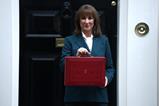The prime minister has called for all pupils in England to study some form of maths up until the age of 18. But Rev George Pitcher believes education should help children to understand the world they live in – and numbers can only go so far in doing that

I want to mount a case for religious education being as important as maths, which prime minister Rishi Sunak wants taught better and longer in schools. First, to a maths lesson.
Nearly 60 years ago, a maths teacher called Major James kept me in from cricket practice to learn to do long division. I sucked my pencil and stared at the exercises he’d set me. And I devised my own way of doing it.
When he came in from cricket, I showed him my workings. He sat down on a step and put his head in his hands and said something like: “Oh Pitcher, what are we to do with you?” The thrust of his point was that nothing would come of me if I didn’t master long division.
I want children to address issues such as: Why is there something rather than nothing, and why are love and hope so vital to their existence?
Major James was a good and kind man and he may well have been right about how my lack of numeracy has hobbled me in life. But he was wrong about long division. Calculators were in our hands shortly after that summer in the mid-60s. Now computers, and even my smartphone, will tell me what 2,760 divided by 46 is in an instant (it’s 60), without meandering pencil steps down a page full of squares.
I’m not a subject snob who looks down on mathematicians - though, admittedly, I did just have to look up how to spell mathematician, and I have teased friends at university that they’re doing “sums”. That said, I was always immeasurably impressed by friends who could look at my double three, triple 17 and 13 on a dartboard and immediately subtract the total from 301, quicker than I can now on a smartphone.
Basic intuition
But that’s intuitive mental arithmetic and natural numeracy. They haven’t learned it; rather they can see the shapes of numbers - and that’s an innate artistry. By contrast, Sunak has let it be known that he wants some form of maths taught in schools until the age of 18.
He claims that there is an “anti-maths” mindset in education, which means that it’s OK, cool even, to be innumerate; an attitude that would never be tolerated with illiteracy. And that this costs our economy dearly.
He joins a long line of Gradgrind conservatives, through Margaret Thatcher (Chemistry, University of Oxford) to all those who have banged on about the importance of the “three Rs” (reading, ‘riting and ‘rithmetic) in producing a useful workforce.
Personally, I think Sunak is wrong (or perhaps ‘rong). Of course the basics of maths must be taught in schools (minus the long division). But – and I don’t think we have to show our workings for this – not everyone is going to blossom from its basic principles into seeing the beauty in maths.
Just as any parent who has winced at their child’s efforts on the recorder is unlikely to witness their growth into concert pianists, so a child taught basic algebra isn’t neccessarily going to grow up to explain by calculation how time ceases to exist in black holes. Better to give them the basics and see where they go.
Missing education
And I would actually go much further than that. A child’s primary and secondary education is prescribed by the national curriculum, key-stage subjects and compulsory subjects at GCSE. Religious education goes mysteriously missing in that.
I think that’s a massive mistake – well, I would, wouldn’t I? But this isn’t just a case of “my subject’s better than your subject, Rishi.” Actually I think they’re entirely compatible, because ultimately they’re both about understanding how the world works.
The point here is that a firm grounding in how the world’s cultures have been formed by religion is every bit as vital for understanding contemporary reality as is particle physics. Perhaps more so – and I say that empirically, irrespective of what dogmatic atheists might dictate.
Maths and science tackle the “how” rather than “why” questions. And we need answers to both
I say this not for reasons of evangelism, but for intensely practical purposes. I want children to address issues such as: Why is there something rather than nothing? Why do people live self-sacrificial lives? Why do humans have consciousness and why are love and hope so vital to their existence? All these questions are at the heart of my Christian faith – and the faiths and cultures of others.
Note that all those issues can be addressed with equal validity by maths and its science derivatives. But they tackle them as “how” rather than “why” questions. And we need answers to both, or at least to be encouraging our children to ask the questions. Religious literacy is important.
So I think it’s very far from good enough for basic maths to be compulsory while religious education is effectively voluntary. Yes, schools have to provide RE, but it’s not part of the national curriculum, parents can withdraw children from the classes and children can withdraw themselves from age 18. I’m tempted to say that if only my parents could have withdrawn me from maths. I’m sure Major James would have welcomed that.
The purpose of education is to prepare children to understand the world they’re born into. Sunak prioritises maths to do so. Beautiful as maths is, it explains the universe only in material terms. And the material is an insufficient explanation of the place of we humans within it.





































No comments yet